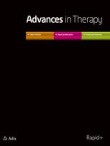
Abstract
Introduction
Our objective was to determine the effectiveness of a perindopril/indapamide (Per/Ind) single-pill combination (SPC) in a broad range of patient profiles, including subgroups with varying hypertension severity, age and cardiovascular risk profiles.
Methods
Patient data from four large prospective observational studies (FORTISSIMO, FORSAGE, PICASSO, ACES) were pooled. In each study, patients already treated for hypertension were switched to Per/Ind 10/2.5 mg SPC and systolic and diastolic blood pressure (SBP/DBP) measured at the 1-month (M1) and 3-month (M3) visits. Study endpoints included change in SBP and DBP from baseline to M1 and M3 and the percentage of patients achieving BP control (SBP/DBP < 140/90 mmHg for patients without diabetes or < 140/85 mmHg for patients with diabetes).
Results
A total of 16,763 patients were enrolled and received Per/Ind (94% received the full dose of 10/2.5). Mean patient age was 61.4 years (36% were ≥ 65 years old), 57% were women, and 16% had isolated systolic hypertension (ISH). Mean baseline office SBP/DBP was 162/94 mmHg, and mean duration of hypertension was 11 years. Cardiovascular risk factors and comorbid conditions were common in this population. Significant mean reductions in SBP (− 23 mmHg) and DBP (− 11 mmHg) were observed at M1 compared with baseline (P < 0.001), which were maintained at M3 (− 30 mmHg and − 14 mmHg, respectively). At M3, BP control was achieved by 70% of patients (78% for ISH). In patients with SBP ≥ 180 mmHg at baseline (grade III hypertension), the mean SBP/DBP decrease was − 51/− 20 mmHg and 53% achieved BP control. Per/Ind was well tolerated with an overall rate of adv erse events of 1.3%, most frequently cough and dizziness at rates of 0.3% and 0.2%, respectively.
Conclusion
In this hypertensive population including difficult-to-control patient subgroups, switching to Per/Ind 10/2.5 mg SPC led to rapid and important reductions in BP. BP control was achieved in 70% of patients overall in an everyday practice context.



No comments:
Post a Comment